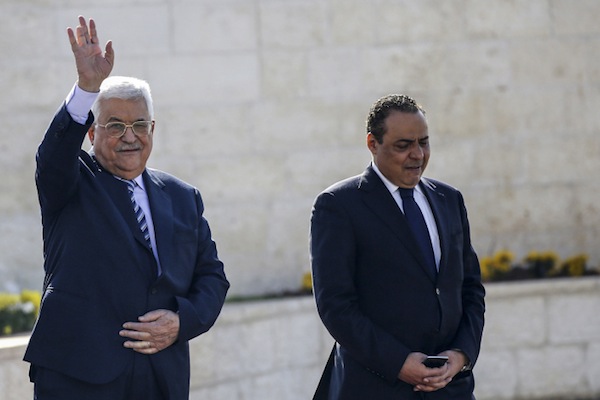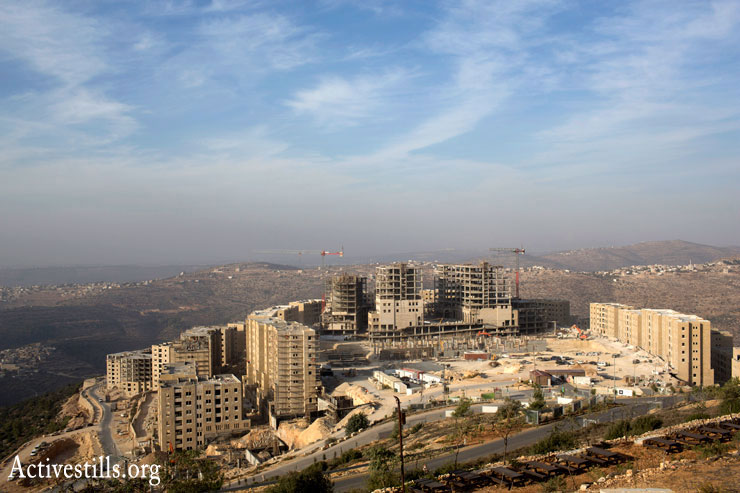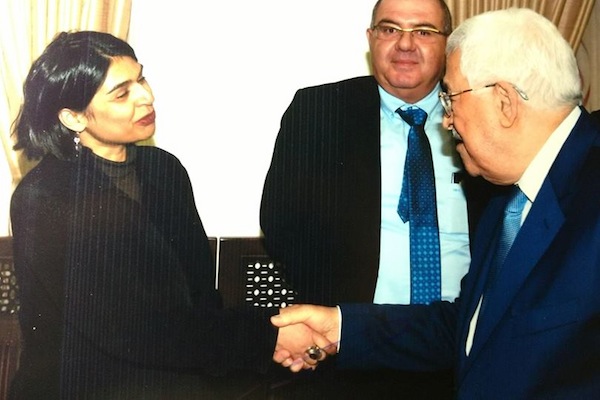Following a meeting with President Mahmoud Abbas in Ramallah, Orly Noy is left with just one question: who is the real partner for peace here?

I was invited to join a delegation of Palestinian citizens of Israel, most of them residents of Jaffa, to Ramallah on Sunday, in order to meet with the Committee for Interaction with Israeli Society, headed by Muhammad al-Madani.
I had met al-Madani over year ago, just before Defense Minister Avigdor Liberman prevented him from entering Israeli territory, claiming that he was working to “influence Israeli politics.” Yes, he is certainly trying to influence Israeli politics. He still believes, with all his naiveté, that Palestinians can circumvent Israeli politicians and speak directly to the Israeli public in order to try and convince them that they have a partner for peace.
Let’s take a moment to think about this: the Palestinian Authority includes a special committee whose entire job is to make connections and dialogue with the Israeli public. It has met with the Mizrahi public, with Israelis from the former Soviet Union, religious Jews, ultra-Orthodox Jews, and of course Palestinian citizens of Israel. While Israel does everything it can to prevent meetings between Israelis and Palestinians, Palestinians are doing all they can to actually meet us.
As we arrived in Ramallah, we quickly discovered that our meeting with al-Madani and the members of his office was only the beginning. We later found out that we would be touring the new Palestinian city Rawabi, 12 miles from Ramallah, followed by a meeting with President Mahmoud Abbas.
A new city on a hill
The tour to Rawabi was surreal. Our guide was the project’s head of marketing, a young, well-spoken and excitable man whose pride in this ambitious project was hard to miss. There is no doubt that he can envision how the city — which now seems like a ghost town — will look like in just a few years: bustling, prestigious, environmentally friendly, and planned down to the last meter. Every stone that was used to build Rawabi, he told us, was quarried from the mountain on which the city is being built — including all the water infrastructure, the electricity (and like all electricity in the West Bank, it comes from East Jerusalem; according to the Oslo Accords, Palestinians are not allowed to create electricity in the West Bank), gas, and telephone lines will be built under the ground. Buses will not be allowed into the city — the municipality will provide a free shuttle service that will bring residents directly to their home from the bus station at the entrance to the city.

Today over 2,000 people live in Rawabi, which is being built for a population of 40,000. Every corner is being built up, and not only with apartment buildings: there are plans for a water park, an ice skating rink, an area for horseback riding, a large commercial center, a glitzy open-air mall with international brands, a cinema, and there is already an amphitheater that has welcomed some of the biggest names in the Arab world. And no, Jews cannot purchase homes there. One of the participants asks whether one must pass through a checkpoint on the way. “Currently no,” answered our guide, “but after all, we are in the West Bank. They can decide at any point to put up a checkpoint.”
The view of Rawabi might be breathtaking, yet it also has a disturbingly synthetic feel to it, especially when compared to Ramallah, to which we returned at the end of the tour. We headed to the Muqata’a, Mahmoud Abbas’ compound, to meet with the president. The lack of security checks at the entrance was touching: a single, beeping metal detector bothered no one — and we were in. After passing by Yasser Arafat’s tomb, we headed into another room where we waited for Abbas.

A photo with the president
I know that Abbas is not well liked, to say the least, among many people I know. They like to call him a “collaborator with the occupation.” As Israelis who are responsible for the impossible conditions under which he operates, I suggest we act with a little bit more humility, especially when it comes to deciding which Palestinians are “good” and which ones are “bad.” But one cannot help but feel a fondness for this cordial, patient, and funny man who sat with us for nearly an hour and spoke honestly and touchingly about the frustration of trying to undo the “no partner” label that Israel forced on him.

Only much later did Abbas realize that there was an Israeli Jew among the group. The conversation was entirely meant for Palestinians. And beyond the longing that he expressed for Jaffa, he mostly spoke about the acute need and strong desire to reach an agreement. “They said accept UN Security Council Resolution 242 and we’ll talk. We accepted. They put that in their pocket and said, ‘condemn terror and we’ll talk,’ we condemned and they put it in their pocket. And nothing. There is no way to express to them that we do not want to sabotage their prosperity — we just want our legal right to prosperity and independence.
Among other things, Abbas said that he insists on meeting with the Jewish community of every city he visits around the world. Think about the meaning behind this. When was the last time an Israeli prime minister ever called for a meeting with the Muslim community or Palestinian representatives in the diaspora?
When Abbas was told that there was a Jewish journalist in the room, I was asked to say a few words. I spoke and then took a photo with the president. I won’t deny it, the visit was touching. Abbas may be a collaborator, a tycoon, weak, and disconnected, but this impressive man gives the feeling that his life goal is to see an independent Palestine. And for that he has built the the Committee for Interaction with Israeli Society, for that he is willing to sit with Israelis in his office.
This article was first published in Hebrew on Local Call. Read it here.


